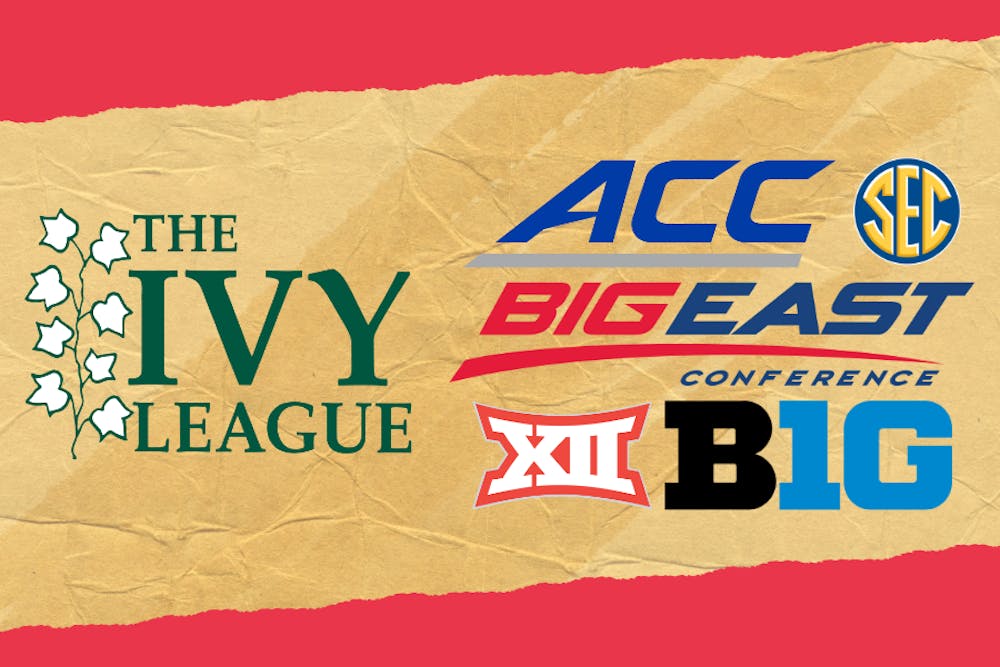It’s January, which means we’re in the heart of the college basketball season. It isn’t a normal season, of course, with the COVID-19 pandemic still raging across the country. Thirty-one of the 32 Division I conferences are currently competing, however, with the Ivy League the lone exception.
That means no games at the Palestra this year, no conference tournament, and no chance to see Penn men’s or women’s basketball (or both!) in March Madness. The league decision, which came from the eight school presidents in November, also canceled all other winter sports and postponed spring sports through at least February.
We can commend the Ivy League presidents for their caution during the pandemic, as many already have, while still recognizing that they could have pulled off a winter season without taking on a health risk significantly different than they already are by bringing students back to campus for the spring.
It’s important to preface this discussion by acknowledging that playing a basketball season takes on some risk of spreading the virus — just as any gathering of multiple people outside the household does. So if the one and only goal of the league presidents was to mitigate COVID spread, they would indeed cancel the season.
That clearly isn’t the case, however, since Penn, along with many of the other Ivy League schools, is housing a large number of students on-campus in the spring. There are also hundreds, if not thousands, of students living together off-campus in Philadelphia.
By inviting students back, the school presidents acknowledge that there are other factors they value outside of simply minimizing COVID cases (like allowing students to develop a sense of community, for example). Once you recognize this idea, it becomes difficult to understand why the league is unable to hold a season for basketball and other winter sports.
College athletics have a lot of value, and they are a highlight of athletes’ time at school. I’m not going to use this space to explain the importance of college sports (especially because I’ve never played one myself), but all you have to do is ask an athlete to get a great answer. As a result of that, it’s simply gut-wrenching for a season to be canceled.
“It’s just heartbreaking for those kids that have this short, four-year window that they worked their whole lives to do,” Penn men’s basketball coach Steve Donahue said to the Washington Post in November, “and it’s taken away.”
Making matters worse is that the Ivy League stubbornly refuses to recognize the extra year of eligibility given to athletes as a result of the pandemic, barring graduate students from competing due to a “longstanding practice” that literally no one cares about.
So there’s significant value to holding a winter sports season. Few people would argue with that. But aren’t the COVID-related risks of holding a season so large that cancellation is a no-brainer?
Not when you compare them to the risks that the schools are already taking by bringing students back to campus. As a result of those decisions, students are already interacting with each other in-person and will continue to do so throughout the semester. No “quiet period” or sternly-worded emails will change that.
Moreover, athletes themselves are living together and training together. Some COVID spread is likely inevitable — just look at Penn’s case dashboard from the fall if you want proof — and canceling sports doesn’t change that.
There’s a relatively simple way to pull off a basketball season. First, the league could have canceled all non-conference games (which it already did), which would eliminate all plane travel and a significant portion of the schedule. Next, it could restrict and regulate practice schedules while implementing regular testing, which could easily be achieved at Penn since students living in Philadelphia are already being tested twice per week.
With only eight teams involved and many of them geographically close to each other, a large fraction of the 14-game Ivy League slate could be pulled off without even having to stay overnight. There would of course be risk in the gathering of teams and the competitions themselves, but testing would help to mitigate that risk.
It seems hypocritical for the league to not even attempt to find a winter sports plan that would work, especially when the same presidents making that decision are also bringing students back to campuses, where a variety of unsanctioned gatherings among students will inevitably occur.
When announcing the cancellation of the winter season in November, the Ivy League presidents wrote about their disappointment given their “strong desire” to resume athletics.
With the conference being the only one of the 32 to not compete this year, it becomes easy to question how strong that desire actually is.

MICHAEL LANDAU is a Wharton senior from Scarsdale, N.Y. and was the Senior Sports Editor for 136th Board of Editors of The Daily Pennsylvanian. He can be reached at landau@thedp.com.









